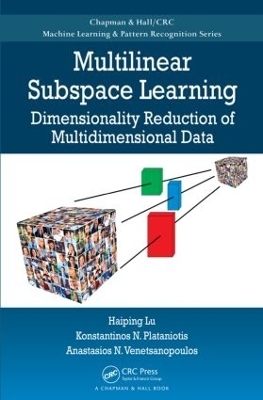
Multilinear Subspace Learning
Dimensionality Reduction of Multidimensional Data
Seiten
2013
Chapman & Hall/CRC (Verlag)
978-1-4398-5724-3 (ISBN)
Chapman & Hall/CRC (Verlag)
978-1-4398-5724-3 (ISBN)
Due to advances in sensor, storage, and networking technologies, data is being generated on a daily basis at an ever-increasing pace in a wide range of applications, including cloud computing, mobile Internet, and medical imaging. This large multidimensional data requires more efficient dimensionality reduction schemes than the traditional techniques. Addressing this need, multilinear subspace learning (MSL) reduces the dimensionality of big data directly from its natural multidimensional representation, a tensor.
Multilinear Subspace Learning: Dimensionality Reduction of Multidimensional Data gives a comprehensive introduction to both theoretical and practical aspects of MSL for the dimensionality reduction of multidimensional data based on tensors. It covers the fundamentals, algorithms, and applications of MSL.
Emphasizing essential concepts and system-level perspectives, the authors provide a foundation for solving many of today’s most interesting and challenging problems in big multidimensional data processing. They trace the history of MSL, detail recent advances, and explore future developments and emerging applications.
The book follows a unifying MSL framework formulation to systematically derive representative MSL algorithms. It describes various applications of the algorithms, along with their pseudocode. Implementation tips help practitioners in further development, evaluation, and application. The book also provides researchers with useful theoretical information on big multidimensional data in machine learning and pattern recognition. MATLAB® source code, data, and other materials are available at www.comp.hkbu.edu.hk/~haiping/MSL.html
Multilinear Subspace Learning: Dimensionality Reduction of Multidimensional Data gives a comprehensive introduction to both theoretical and practical aspects of MSL for the dimensionality reduction of multidimensional data based on tensors. It covers the fundamentals, algorithms, and applications of MSL.
Emphasizing essential concepts and system-level perspectives, the authors provide a foundation for solving many of today’s most interesting and challenging problems in big multidimensional data processing. They trace the history of MSL, detail recent advances, and explore future developments and emerging applications.
The book follows a unifying MSL framework formulation to systematically derive representative MSL algorithms. It describes various applications of the algorithms, along with their pseudocode. Implementation tips help practitioners in further development, evaluation, and application. The book also provides researchers with useful theoretical information on big multidimensional data in machine learning and pattern recognition. MATLAB® source code, data, and other materials are available at www.comp.hkbu.edu.hk/~haiping/MSL.html
Haiping Lu, Konstantinos N. Plataniotis, Anastasios Venetsanopoulos
Introduction. Fundamentals and Foundations: Linear Subspace Learning for Dimensionality Reduction. Fundamentals of Multilinear Subspace Learning. Overview of Multilinear Subspace Learning. Algorithmic and Computational Aspects. Algorithms and Applications: Multilinear Principal Component Analysis. Multilinear Discriminant Analysis. Multilinear ICA, CCA, and PLS. Applications of Multilinear Subspace Learning. Appendices. Bibliography. Index.
| Reihe/Serie | Chapman & Hall/CRC Machine Learning & Pattern Recognition |
|---|---|
| Zusatzinfo | 6 Tables, black and white; 56 Illustrations, black and white |
| Sprache | englisch |
| Maße | 156 x 234 mm |
| Gewicht | 544 g |
| Themenwelt | Informatik ► Datenbanken ► Data Warehouse / Data Mining |
| Mathematik / Informatik ► Informatik ► Theorie / Studium | |
| Mathematik / Informatik ► Mathematik ► Algebra | |
| Technik ► Elektrotechnik / Energietechnik | |
| Technik ► Umwelttechnik / Biotechnologie | |
| ISBN-10 | 1-4398-5724-5 / 1439857245 |
| ISBN-13 | 978-1-4398-5724-3 / 9781439857243 |
| Zustand | Neuware |
| Haben Sie eine Frage zum Produkt? |
Mehr entdecken
aus dem Bereich
aus dem Bereich
Datenanalyse für Künstliche Intelligenz
Buch | Softcover (2024)
De Gruyter Oldenbourg (Verlag)
CHF 104,90
Auswertung von Daten mit pandas, NumPy und IPython
Buch | Softcover (2023)
O'Reilly (Verlag)
CHF 62,85


